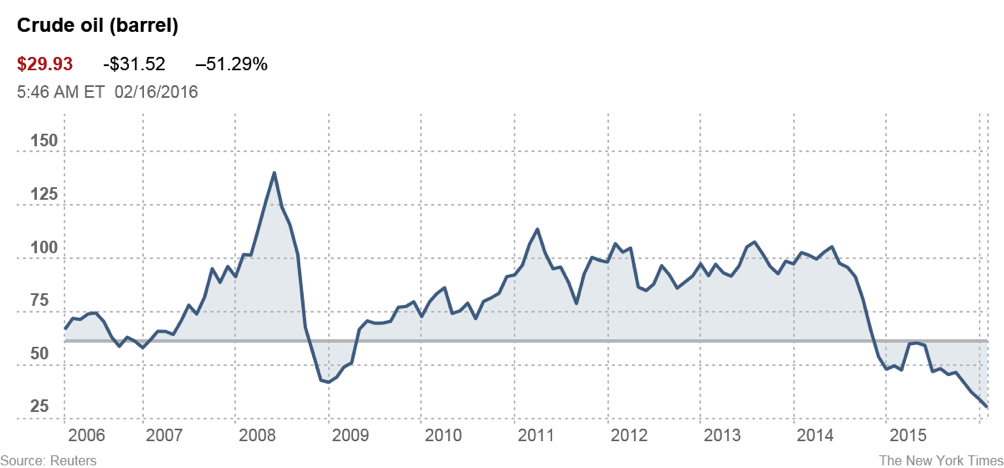One of the most important aspect affecting the economy and the financial markets in the last weeks is the oil price drop. Today the Brent crude, which is the main international benchmark, is trading at 33.93$ with a more than 70% fall since June 2014.
To analyze why the oil’s price is dropping so fast, we have to start from the simple supply and demand model. Indeed, United States during the last years had doubled its domestic production causing a shift to Asian markets for Saudi, Nigerian and Algerian oil which previously was mainly sold in the US. The consequence is a fear competition that forced the producers to lower the prices. Furthermore, Canadian, Iraqi and Russian oil production and exports are rising during the last years. The overall effect of these patterns is a consistent drop in oil prices as underlined by the following graph.
To analyze why the oil’s price is dropping so fast, we have to start from the simple supply and demand model. Indeed, United States during the last years had doubled its domestic production causing a shift to Asian markets for Saudi, Nigerian and Algerian oil which previously was mainly sold in the US. The consequence is a fear competition that forced the producers to lower the prices. Furthermore, Canadian, Iraqi and Russian oil production and exports are rising during the last years. The overall effect of these patterns is a consistent drop in oil prices as underlined by the following graph.
On the opposite side, some analysts argue that to some extent the production is falling due to the drop in exploration investment, as underlined also by RBC Capital Markets that calculated the projects able to produce more than half million barrels a day of oil were cancelled. However, the latter drop in production is not sufficient and not fast enough to prevent the drop in oil prices.
Turning on the demand side, both in Europe and in developing countries it is weak and the spread of more energy-efficient vehicles makes the situation even worse.
These considerations are pushing the economies to find a solution. Indeed, today Saudi Arabia and Russia ministers agree to freeze oil output at January levels to reduce the supply glut and raising prices through coordinated actions. Of course it is an important news reflecting new efforts by the two countries to stop the drop in oil prices after about 15 months of unilaterally cost cutting. The news coming out as an unexpected surprise for the worldwide financial markets, pushed prices up by as much by 6% on Tuesday morning.
However this initiative, even though extremely important, need to be fully implemented and joint by other producers like Saudi Arabia, Iran and Iraq; scenario not completely foregone given the political tensions and the belief of not restrict output among these countries.
To sum up, in my opinion this is the first important sign that something is changing, but more is needed especially by the OPEC countries which have to undertake coordinate actions to stabilize markets and oil prices. Moreover my idea is that the economy is still far from recover and stabilize itself because oil production is not declining fast enough especially in the US where for instance the output has proved to be resilient to lower prices. Therefore, freezing the output could be the starting point but coordination between the most important countries in this game should be the next one to avoid that this drop in oil price could have strong and deeper effect on Financial Markets and real economy.
Francesco Manzo
Turning on the demand side, both in Europe and in developing countries it is weak and the spread of more energy-efficient vehicles makes the situation even worse.
These considerations are pushing the economies to find a solution. Indeed, today Saudi Arabia and Russia ministers agree to freeze oil output at January levels to reduce the supply glut and raising prices through coordinated actions. Of course it is an important news reflecting new efforts by the two countries to stop the drop in oil prices after about 15 months of unilaterally cost cutting. The news coming out as an unexpected surprise for the worldwide financial markets, pushed prices up by as much by 6% on Tuesday morning.
However this initiative, even though extremely important, need to be fully implemented and joint by other producers like Saudi Arabia, Iran and Iraq; scenario not completely foregone given the political tensions and the belief of not restrict output among these countries.
To sum up, in my opinion this is the first important sign that something is changing, but more is needed especially by the OPEC countries which have to undertake coordinate actions to stabilize markets and oil prices. Moreover my idea is that the economy is still far from recover and stabilize itself because oil production is not declining fast enough especially in the US where for instance the output has proved to be resilient to lower prices. Therefore, freezing the output could be the starting point but coordination between the most important countries in this game should be the next one to avoid that this drop in oil price could have strong and deeper effect on Financial Markets and real economy.
Francesco Manzo
